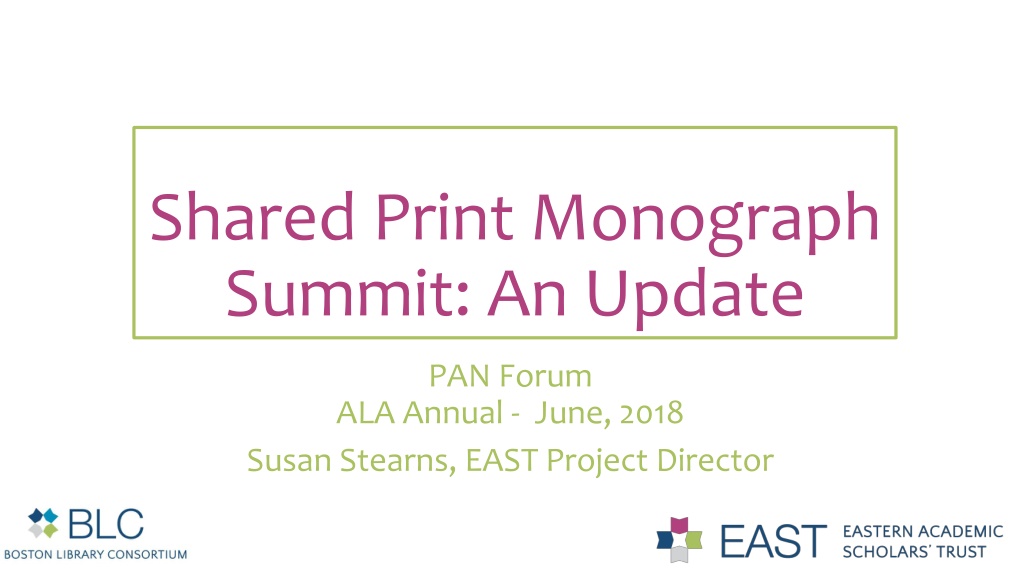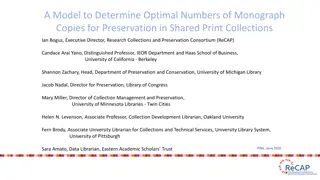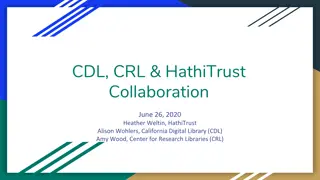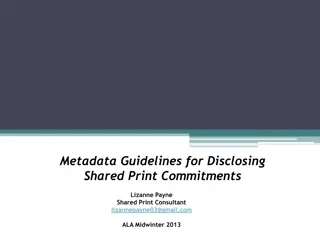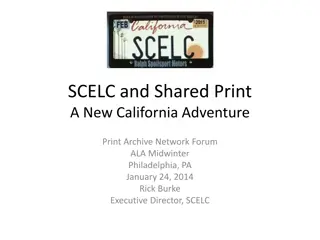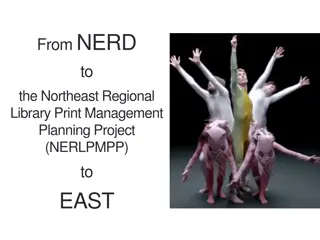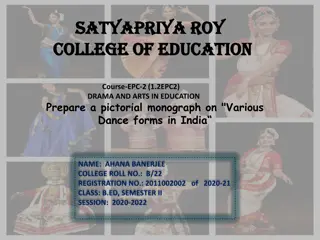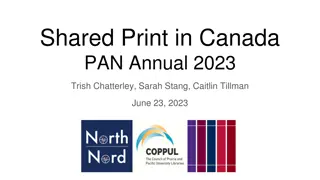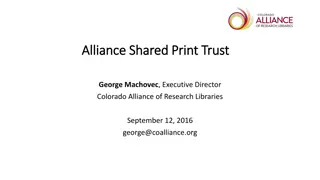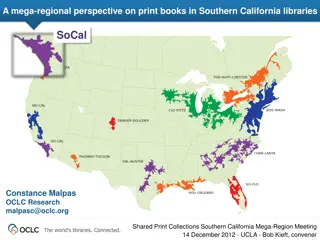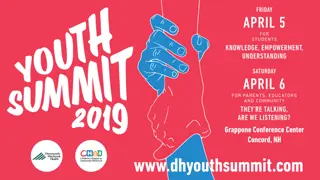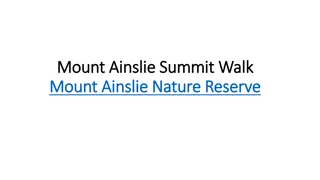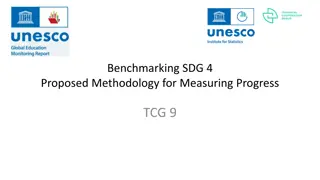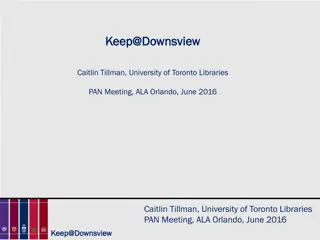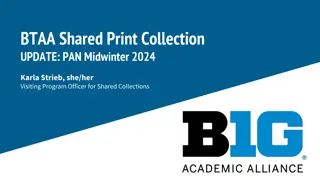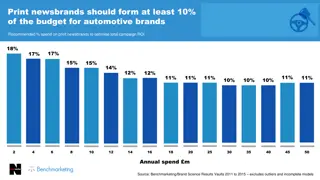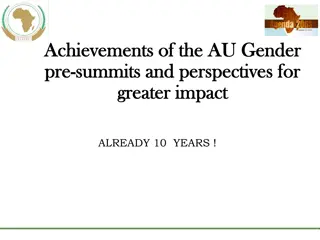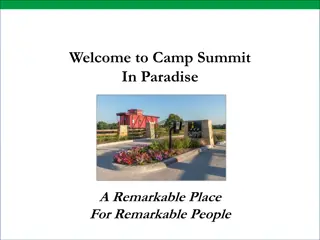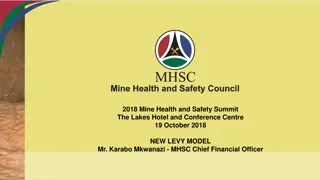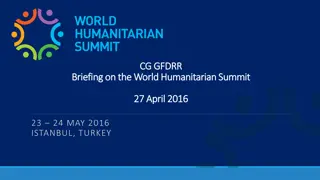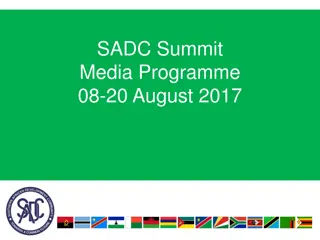Shared Print Monograph Summit: Progress and Future Directions
The Shared Print Monograph Summit held in June 2018 focused on collaboration and coordination among North American shared print programs. Key priorities included open data on retention commitments, research on risks, establishing community standards, and more. Working groups were formed to address organizational structure, retention data, resource sharing, standards, risk research, and communications. Recommendations for an organizational structure to support collaboration in preserving and sharing monographic resources were made to the community.
Download Presentation

Please find below an Image/Link to download the presentation.
The content on the website is provided AS IS for your information and personal use only. It may not be sold, licensed, or shared on other websites without obtaining consent from the author. Download presentation by click this link. If you encounter any issues during the download, it is possible that the publisher has removed the file from their server.
E N D
Presentation Transcript
Shared Print Monograph Summit: An Update PAN Forum ALA Annual - June, 2018 Susan Stearns, EAST Project Director
What/Who/When/Where..Why? A summit sponsored by EAST and funded by Mellon Program staff from North American shared print programs focus on monographs Other thought leaders, funders for details see the Summit site - https://sites.google.com/a/blc.org/summit/ April 5-6, 2018 in Boston Focus on collaboration and coordination Active engagement, remove barriers to collaboration, make active commitments to work together, chart a path forward
The Two Days Maureen Sullivan, Facilitator Jeff Kosokoff, Recorder Combination of large and small group sessions Focused on a set of key questions: What are we trying to accomplish with collaboration? What are the challenges and opportunities? What are the essential components to enable collaboration? What do these components suggest are the most critical priorities?
Key Priorities Shared open data on retention commitments Research on risk and related issues Establishing community standards and compliance Connecting online availability/access to retention Federated organizational structure Developing narratives on the value of shared print for various audiences and stakeholders
The Working Groups Organizational Structure convened by Kirsten Leonard, PALNI Shared Open Retention Data convened by Lizanne Payne, HathiTrust Resource Sharing convened by Doug Brigham, COPPUL Standards convened by Mei Mendez, EAST Risk Research convened by Ian Bogus, ReCap Communications convened by Galadriel Chilton, Ivy Plus Libraries
Organizational Structure Working Group Charge: The purpose of this working group is to recommend an organizational structure to support collaboration among shared print monograph initiatives in North America by coordinating the long-term preservation, accessibility and integrity of monographic resources. The Working Group will: Create a report recommending a organizational structure that supports collaboration and resource sharing that will be delivered to the community at the next summit. Deliverables: Recommend an interim advisory and reporting structure to support the working groups to do their work Recommendation of an ongoing organizational structure to the collaborative group of participants Time Frame: Date of preliminary report: EAST Summit Part 2
Organization Guiding Principles: Some Initial Thoughts Supports advancing the collaboration & coordination of shared print Support prioritization, focus and coordination across working groups Identify infrastructure & operating practices to support the WG Transparent, inclusive, lightweight Flexible to adapt to changing stages and shifts in priorities
Organization Guiding Principles: Some Initial Thoughts (con t) Cost-effective: contain costs to align with value Considers the relationship to local shared print programs including funding support & staffing Considers a means of leveraging the collective will for lobbying efforts
Shared Open Retention Data Working Group Focus on shared open record of retention commitments with cost- effective ways to participate and the ability to analyze. Transparency and openness of collective data paramount. The Working Group conducted these activities: Developed an inventory of where/how shared print monograph groups are currently recording retention data (https://bit.ly/2JhzmC9) Developed a draft document Use Cases for Shared Open Retention Commitment Data (https://bit.ly/2JxaqpN) Prepared recommendations for the Summit group
Recommendations Primary recommendations: Explore a separate interim or bridge solution for an open shared print data repository pending longer-term development by OCLC Steps: Complete the Use Case document and identify priorities Invite interested organizations to respond, describing their current and near- term functional capabilities and outlining any membership or business case issues Present results to the Summit at the next meeting. This would be a preliminary exploration; significant additional work would be needed to implement any solution.
Resource Sharing Working Group Began by surveying existing programs to: Understand current policies and practices for resource sharing within and across programs Investigate opportunities for deeper collaboration Data showed that Resource sharing as a set of activities is well established at the both the institutional and consortial levels. However, it remains fairly de-centralized. Little or no standardization on service expectations Few written best practices Just beginning to consider tracking statistics to understand the impact of shared print
Opportunities for further work Encourage organizations to make their policies and practices more readily available Encourage more standardization in resource sharing Encourage development of best practices for Service times Policies Statistics Use of OCLC codes for retained monographs Examine whether there is an appetite in the community for coordination of best practices / principles.
Standards Working Group Charge: The Standards Working Group will explore the possibility of establishing a group that will create (and share) community standards and perhaps even certify compliance and define levels (cf. LEED). Standards could include levels of validation, storage conditions, digitization, rareness/scarcity, optimal number of copies for various kinds/types of books, services based on retained print, national print retention rightsizing, data quality (not only for bibs, focus on metadata for holdings, access, and retention commitments).
Recommendations Create a new working group, composed of individuals active in the following categories: Specialists in institutions involved in shared print (metadata, resource sharing, collection management?) Shared print program representatives (i.e., folks like above, but who focus at system level) That the mission of the new working group should be: To support trust and reliance in a system of shared monograph retention, promote, identify and/or establish community standards and perhaps even certify compliance. Such standards, best practices and guidelines will support better local decision-making, speed resource sharing, strengthen long-term preservation, and ensure interoperability between the diverse networks and programs that will administer retention locally. Email: mmendez@blc.org if interested in serving
Recommendations (cont) Timeline and deliverables First 6 months: Environmental scan of existing standards and guidelines* Next 3 months: Building on the scan, identify gaps where guidelines are lacking. Consider how to fill the gaps. Prioritize the order in which gaps should be addressed, and possibly by whom. By nine months: Write/share a report and recommend next steps *Some of the areas under consideration: metadata, validation, storage environment, condition, replacement actions, optimal number of copies & last copy, etc. We invite feedback from the community on existing standards via this crowd-sourced document https://sites.google.com/a/blc.org/summit/
Risk Research Working Group This group is charged with identifying monographs that are at risk and why. The Task Force will: Perform a scan of existing and previous risk related projects. Review available data, for example the EAST Validation study Identify gaps in risk models and research Propose research to fill any exposed gaps Advise interested parties if there are imminent risks to the completeness or accessibility of the printed record
Risk Research (cont) Milestones: Sept.1 Complete review of prior work Dec.1 Compile a list of research gaps with priorities
Communications Working Group The Shared Print Communications Working Group was tasked with enabling the development of compelling narratives around shared print. The group s initial work to carry out this assignment focused on defining target audiences for communications and then exploring ways of determining why shared print efforts are important for each constituency. Began by identifying core audiences for communications and then began to explore how best to engage each audience group
The Audiences and Narrative Matrix University administrators, faculty (humanities, social sciences, STEM), students, library staff and administrators, consortia members, general public, very large research libraries, and smaller (non-research) libraries. Developed a narrative matrix to formulate and test assumptions about each group Done through: Reviewing news articles Conversing with representative members of each group Gathering information from communication and marketing staff
Conclusions to Date Members of the academic community care deeply about books It is imperative that the stories we tell focus on expanding and guaranteeing access Shared print is a component of these stories, but it is not THE STORY We must maintain an acute awareness of audience in all of our storytelling We must be vigilant against falling into the trap of telling stories to each other: the key is to tell compelling stories that resonate with those outside libraries
Recommended Actions A key role for Shared Print Group is a non librarian who is a strong communicator and advocate of libraries; create and fill this role. Tell the story of our work to expand and guarantee access. Establish realistic expectations around access to collections, and then meet (or exceed these expectations) so as to build constituents trust. Tell the story of unique and interesting collections and how libraries take great care of them (e.g. preservation) and how even non-research libraries have such items and can participate in shared collaboration Create a list of stopwords and library jargon; words that we should strongly consider NOT using when communicating to key stakeholders outside libraries.
Next Steps Each Working Group has specific plans for continuing in some way over the next 3-6 months EAST anticipates sponsoring a follow-up meeting in late fall/early winter to push forward with the work We invite feedback from the community on two documents: https://sites.google.com/a/blc.org/summit/ Use cases for shared open retention data Crowd-sourced document on existing standards Our goal is to be as transparent as is feasible and to engage deeply with other organizations who share our mission and goals So, stay tuned .
Thank you. . https://sites.google.com/a/blc.org/summit/ sstearns@blc.org Education, Owl graphics by Freepik, Flaticon, CC BY 3.0 (via Logo Maker) www.eastlibraries.org
